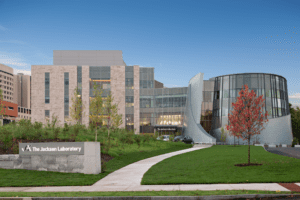 Charles Lee, Ph.D., FACMG, is Scientific Director and Professor at The Jackson Laboratory for Genomic Medicine (JAX) and a Fellow of the American College of Medical Genetics. MetroHartford Alliance Content Manager Nan Price spoke with Dr. Lee about JAX’s contribution to technology and sciences in Connecticut and how JAX is involved with testing and contributing to COVID-19 vaccine and treatment research.
Charles Lee, Ph.D., FACMG, is Scientific Director and Professor at The Jackson Laboratory for Genomic Medicine (JAX) and a Fellow of the American College of Medical Genetics. MetroHartford Alliance Content Manager Nan Price spoke with Dr. Lee about JAX’s contribution to technology and sciences in Connecticut and how JAX is involved with testing and contributing to COVID-19 vaccine and treatment research.
NAN PRICE: What type of research takes place at JAX?
CHARLES LEE: At JAX’s genomic medicine facility in Farmington, we have about 500 employees who are focused on creating genomic solutions for human health. The JAX headquarters in Bar Harbor, ME is grounded in more than 90 years of mouse genetics, using mice to model human diseases. The creation of the JAX facility here in Connecticut complements the mammalian genetics expertise we have in Maine, enabling the two campuses to collectively focus on discovering the genomic causes of human disease and developing individualized diagnostics, treatments, and cures.


This led us to focus on four scientific subspecialties for our research: human genetics, immunology, cancer, and the microbiome; with considerable emphasis on building up the technological and computational aspects of these scientific areas. Indeed, our presence in the state establishes a critical mass of fantastic genomic research that is occurring between us and institutions such as the University of Connecticut and Yale University.
Moreover, we knew we had to have a clinical diagnostic laboratory that would provide a bridge between our research and people—the patients. Before joining JAX, I learned how busy a typical hospital-based diagnostic laboratory was in providing service for their patients. Those hospital-based diagnostic laboratories have limited time and resources to bring on new tests. Since we are not a hospital, this becomes a “sweet spot” for JAX Genomic Medicine. Having a clinical diagnostic laboratory on the premises and working closely with our scientists we can devote more time and energy into translating our research into novel diagnostic genetic assays.
NAN: You’ve touched on the advantages of JAX being here in Connecticut. Tell us about some of the collaborations with local organizations and higher education institutions.
CHARLES: I’ve been in Connecticut with JAX for over seven years and I love it here. There’s an incredible level of collegiality here at JAX and throughout Connecticut, which is so conducive to quickly establishing new collaborations. JAX Genomic Medicine is also ideally placed—between an academic hospital that has clinicians who are very passionate about doing great research (UConn Health) and the UConn Technology Innovation Park, where many startup biotech companies are setting up shop and interacting with our scientists.
Read the complete interview at the Connecticut Health Council website.
Learn more about Genetics and Genome Sciences in Connecticut, read the Innovation Destination Hartford interview with Brenton Graveley, Ph.D., who runs the The Graveley Lab in the Department of Genetics and Genome Sciences at the University of Connecticut Health Center.
